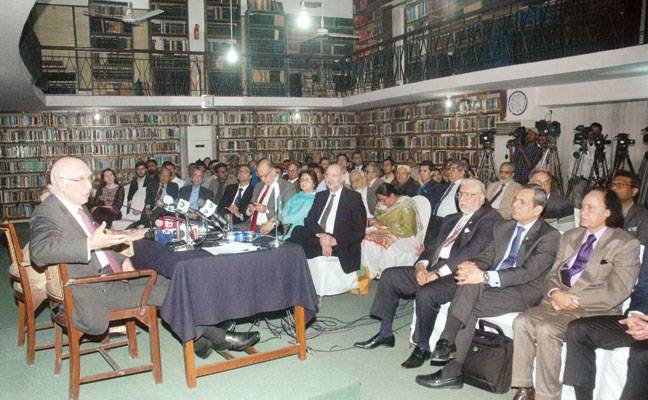KARACHI - The nuclearisation and militarisation of Indian Ocean poses a grave threat to the regional peace and security, Adviser on Foreign Affairs Sartaj Aziz said on Saturday.
Speaking as chief guest at the inaugural session of a three-day International Maritime Conference, he said 30 countries are connected through this ocean, which provides connectivity to the Middle East, Africa and Australia with Europe.
Aziz said that 40 percent of the world trade passes through the India Ocean and Pakistan has enhanced strategic stakes in peaceful navigation of cargoes in this ocean because of development of Gwadar Port and launch of CPEC [China-Pakistan Economic Corridor].
He emphasised the need for turning the Indian Ocean into a zone of peace and prosperity to benefit the whole region. He warned that any rivalry in the ocean would only impede the process of development.
The adviser said all the regional countries have an important role to develop common bonds for sustainable development. He stressed that trade could only flourish in the region if sea routes are secure.
He said Pakistan was the third most important country in the region, and it is taking all the requisite steps to ensure maritime security in the ocean. But Sartaj Aziz stressed that peace of this region is in danger due to nuclear weapons of India.
He laid emphasis on the importance of uninterrupted use of seas for the common good and said that marine environment is also an essential component of global life support system and investing in marine eco-systems can help us improve ocean management. He assured unstinted support of Pakistan government to local and international investors for the development of maritime sector.
Naval chief’s address
Earlier, in his inaugural address on the occasion, Naval Chief Admiral Zakaullah said a special Force has been established for security of CPEC and Gwadar Port.
The CPEC may have a lasting impact on regional maritime activities and significantly enhance the economic importance of the Indian Ocean, he said.
“The 7th International Maritime conference comes with an opportune time when China-Pakistan Economic Corridor and Gwadar Port have been recently operationalised, as a result of which maritime activities in the region are set to increase manifold,” Zakaullah said.
He underlined that CPEC, which is a part of China’s One Belt One Road (OBOR) project, is a defining development which has the potential to play a trend setting role in the region maritime landscape.
“CPEC and Gwadar Port have emerged as potential stimuli for socio-cultural integration and politico-economic development, providing much desired connectivity and excess for the entire region,” he said.
The naval chief also stressed that multifaceted challenges such as maritime terrorism, piracy, trafficking in drugs, people, firearms as well as issues related to maritime environment “cannot be addressed single-handedly by any of the nation and require a collaborative approach.”
The International Maritime Conference is one of the main events of the Multinational Naval Exercise AMAN-2017, which is currently taking place near Pakistan’s port city of Karachi in the Arabian Sea.
Other activities at
conference
Later Azad Jammu & Kashmir President Sardar Masood Khan also addressed the gathering as keynote speaker. He accentuated the challenges and opportunities of geopolitical and economic trends in the Indian Ocean Region.
In the second session of the conference, Sri Lankan Naval Chief Vice Admiral R C Wijegunaratne was the chief guest who appreciated the efforts of Pakistan Navy in holding AMAN-17 and conduct of the maritime conference.
The dignitary also called on Pak Navy chief Admiral Muhammad Zakaullah in a separate meeting and discussed the matters of bilateral naval collaboration and role of PN’s effort in maintaining security and stability in Indian Ocean Region.
The prominent speakers of the session, PN Karachi Commander Rear Admiral Farrokh Ahmed deliberated on the strategic options for Pakistan Navy in emerging geopolitical scenario, whereas Dr Christine Bueger from the United Kingdom spoke on role of Pakistan in the Western Indian Ocean Security Architecture. Afterwards, Captain (r) Martin A Sebastian from Malaysia talked about Organised Maritime Crimes and discussed different strategies for their effective management in the region.
In the last session of the day, speakers presented research papers on noteworthy topics like Indian Expansionist Designs remain the greatest security risk to South Asia, Strategic Outlook in the Indian Ocean Region: Nuclear Dimensions and Impact on Deterrence Stability. Former Naval Staff chief Admiral Shahid Karimullah was the chief guest in the last session.
The National Centre for Maritime Policy Research (NCMPR) had invited eminent scholars from Australia, Brazil, Canada, China, Malaysia, Sri Lanka, Thailand, UK and the USA to deliberate on the topic “Strategic Outlook in The Indian Ocean Region 2030 and Beyond - Evolving Challenges and Strategies”.






